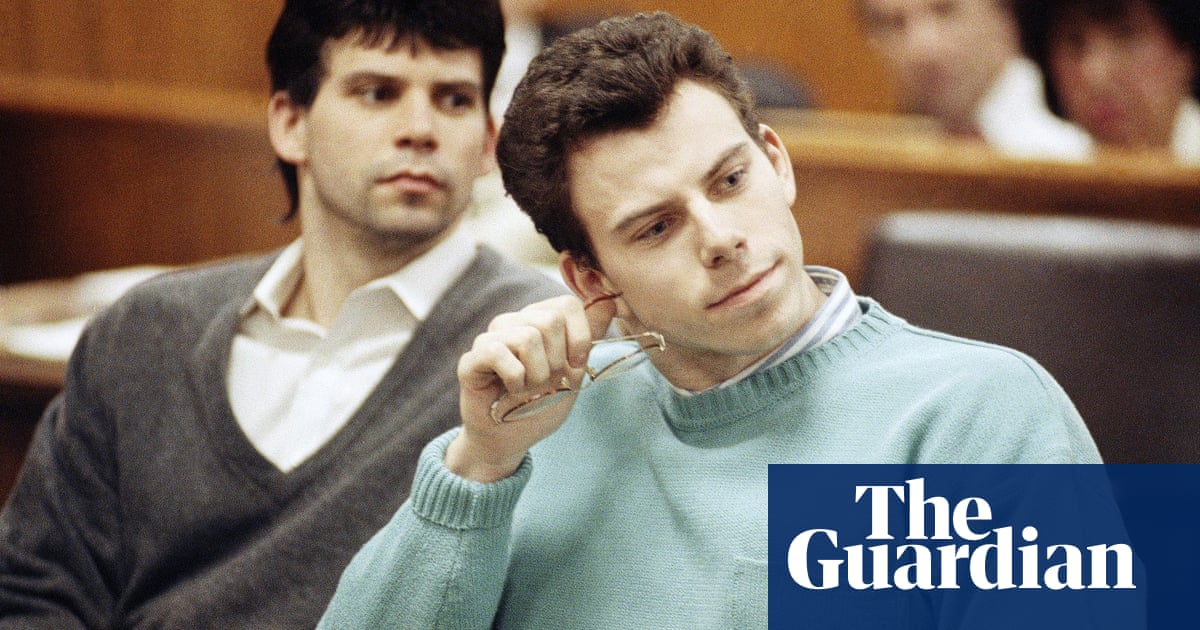The Menendez brothers have spent years waiting for another day in court and a chance to prove that they should be freed after serving over three decades in prison for the 1989 slayings of their parents.
This week it appeared their time was perhaps finally coming – a judge was set to review their request for a resentencing and determine whether they have been rehabilitated. Their attorney, Mark Geragos, planned to ask theLos Angelescounty judge Michael Jesic to reduce Erik and Lyle Menendez’s charges to manslaughter, which would allow them to be released from prison immediately.
But as has often been the case in the brothers’ decades-long fight for release, it was not so straightforward. After a tense day in court, the Los Angeles county judge Michael Jesic delayed the proceedings until next month in response to the disputes between the defense and prosecution.
“Today was a little bit disappointing for us as a family,” Anamaria Baralt, the brothers’ cousin toldNBC Los Angelesoutside the courthouse on Thursday. “There have been some delays in this process that were unforeseeable, like the wildfires, that, of course, we have great patience for. This is another delay that is not so much, but we will continue to show up as a family.”
In the last year, the brothers have hadnew hopefor the possibility of their release after a wave of public support, as well as the former Los Angeles district attorney’s announcement that he would recommend they be resentenced, and a decision from the governor to order the parole board to determine if they would pose a risk to the public if they were released.
In 1996,Erik, 54, and Lyle, 57,were convicted of first-degree murder in the shotgun killings of José Menendez, an entertainment executive, and Kitty Menendez. A judge sentenced them to life in prison without parole. The brothers said they feared their parents were going to kill them to cover up years of sexual, psychological and physical abuse they had suffered at the hands of their father. Prosecutors portrayed the brothers as wealthy young men who killed to obtain their multimillion-dollar inheritance, and have argued they were not abused.
They have recently sought freedom through multiple legal avenues, including by asking for a new trial in light of new evidence of their father’s abuse, a petition for clemency from the governor, and a request for resentencing. And last year, for the first time since their convictions, it began to appear they could have a meaningful shot at freedom. Adocumentaryand a popular – albeitcontroversial–Netflix serieshighlighted their stories and accounts of abuse and they received support from criminal justice reform advocates, includingKim Kardashian.
George Gascón, the progressive former Los Angeles county district attorney, recommended the brothers be resentenced to 50 years to life, which would have made them immediately eligible for release underCalifornialaw. He said he believed the brothers were “subjected to a tremendous amount” of dysfunction and molestation, and argued they had paid their debt to society. He pointed to their behavior in prison where they have earned college degrees and served as mentors and caregivers.
But Gascón lost his seat to Nathan Hochman in November, and the new district attorney said he would not support resentencing and asked the court to rescind his predecessor’s motion. He argued the brothers have not taken full responsibility for their crimes and his office has said it does not believe they were abused.
The brothers’ family, the majority of whom support their release, have been highly critical of the new DA, and asked that he be removed from the case. They said he is “incapable of handling this process with the fairness, care, or neutrality required by law”.
This week’s hearing unfolded with the family in attendance as well as the brothers, who watched the proceedings via video from a state prison near San Diego.
Hochman’s office had sought to delay this week’s proceedings, which were postponed in January because of the Los Angeles wildfires, to allow the court to obtain part of the comprehensive risk assessments completed by the state parole board.
“If there is a report out there assessing the risk of violence, how do we not use it?” Habib Balian, the deputy district attorney, said in court on Thursday.
The judge ultimately decided to postpone the proceedings to allow the prosecution and defense time to review the document, which the governor’s office has said is not a stand-alone risk assessment. The hearing in May will also look at at a pending request from the brothers’ attorney, Geragos, on whether the district attorneys office should be recused from the case.
Geragos had denounced the district attorney for discussing the risk assessment report in a morning news conference. He said the DA’s treatment of the case was “appalling” and he and and attorney Bryan Freedman, who represents Menendez relatives, were particularly critical of prosecutors’ decision in a hearing last week to show, without warning, a graphic crime scene photo of Jose Menendez while relatives were present.
“That’s not dignity,” Freedman said. “That’s disrespect. That’s harassment.”
Balian apologized for not warning the family about the image, but said: “Erik and Lyle Menendez caused that carnage, not me.”
The family has said the act “retraumatized” them and led to the hospitalization of Terry Baralt, Jose’s sister, an 85-year-old with cancer who was in critical condition. “This wasn’t just cruel. It was a clear violation of our rights,” the family said in astatement.
“Our forgiveness for Erik and Lyle does not erase our grief. It does not mean we don’t mourn José and Kitty. It means we believe that people can grow. That trauma begets trauma,” the statement continued. “And yet this District Attorney’s Office seems determined to punish us for that humanity.”
The next hearing for the brothers is scheduled for 9 May.
The Associated Press contributed to this report
